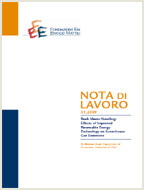Civil Liability, Safety and Nuclear Parks: Is Concentrated Management Better?

06.04.2011
Gérard Mondello
Q5, Q58, Q53, K23, L13, L52, L94
Strict Liability, Electric Energy, Nuclear Plants
Energy: Resources and Markets
Carlo Carraro
Ultra-hazardous risky activities as nuclear industry cannot be considered as “normal industries” i.e. industries without abnormal environmental and health risks. Consequently, the industrial organization of these specific sectors is of the utmost importance. This paper aims at studying this question. We focus on the associated costs of prevention and civil liability. We analyze how civil liability rules may contribute to extend or to discourage the expansion of nuclear parks to new operators. The paper compares the consequences of extending the management of nuclear stations to several independent operators. This question can apply to the unification process of the European electricity market in which several public and private nuclear power operators are running. The paper shows that the choice between either a monopolistic scheme (one operator managing several plants) or a decentralized one (one operator by station) depends on the condition of application of the legal civil liability regime and on the strength of the safety control exerted by the Nuclear Regulatory Authorities. It is shown that when the control is high, then the safety costs generated by the monopolistic organization are less than the same costs of a decentralized one. However, conditions on the insurance policy can mitigate this result.
